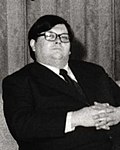
Michael Kenneth Moore was a New Zealand politician, union organiser, and author. In the Fourth Labour Government he served in several portfolios including minister of foreign affairs, and was the 34th prime minister of New Zealand for 59 days before the 1990 general election elected a new parliament. Following Labour's defeat in that election, Moore served as Leader of the Opposition until the 1993 election, after which Helen Clark successfully challenged him for the Labour Party leadership.

James Patrick Anderton was a New Zealand politician who led a succession of left-wing parties after leaving the Labour Party in 1989.
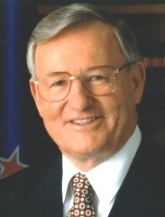
The 1990 New Zealand general election was held on 27 October to determine the composition of the 43rd New Zealand parliament. The governing Labour Party was defeated, ending its two terms in office. The National Party, led by Jim Bolger, won a landslide victory and formed the new government.
Jack Arnold Elder is a New Zealand former politician. He was an MP from 1984 to 1999, representing the Labour Party, New Zealand First and Mauri Pacific.
The Onehunga by-election of 1980 was a by-election for the Onehunga electorate during the 39th New Zealand Parliament. It was prompted by the death of Frank Rogers, a Labour Party MP. It was held on 7 June 1980 and was won by Fred Gerbic, also of the Labour Party.

Māngere Bridge is a suburb of Auckland, New Zealand, under the local governance of the Auckland Council. Surrounded by the Manukau Harbour, the area is the most north-western suburb of South Auckland, and is connected to Onehunga in central Auckland by three bridges that cross the Māngere Inlet. Many features of the Auckland volcanic field are found in and around Māngere Bridge, including Māngere Mountain, a 106-metre-high (348 ft) feature in the centre of the suburb, and Māngere Lagoon, a volcanic tidal lagoon opposite Puketutu Island in the harbour. The suburb is also home to Ambury Regional Park, a working farm and nature sanctuary run by Auckland Council, that connects to the Kiwi Esplanade and Watercare Coastal walkways.

Māngere is a New Zealand parliamentary electorate, returning one member of parliament to the Representatives of New Zealand. The current MP for Māngere is Lemauga Lydia Sosene of the Labour Party. She has held this electorate since 2023.

Norman Vazey Douglas was a New Zealand trade unionist and left-wing politician. He joined the New Zealand Labour Party in 1932, but when John A. Lee was expelled from the party in 1940, Douglas followed to join the new Democratic Labour Party. He rejoined the Labour Party in 1952 and represented the Auckland Central electorate in Parliament from 1960 until his retirement in 1975, serving time on the Opposition front bench.
Malcolm Douglas is a former New Zealand politician of the Labour Party. He lives in Karaka south of Auckland.

Colin James Moyle was a New Zealand politician. A member of the Labour Party, he served as a Member of Parliament (MP) from 1963 to 1976 and again from 1981 to 1990. He was a Government minister in the Third Labour and Fourth Labour Governments. He was a close confidant of Bill Rowling during Rowling's short premiership. In the Fourth Labour Government, as Minister of Agriculture, Moyle oversaw the removal of farming subsidies and the establishment of a fisheries quota system.

Dorothy Catherine Jelicich was a New Zealand politician of the Labour Party. She served one term in the House of Representatives representing the Hamilton West electorate, and was afterwards a city councillor in Hamilton and then Manukau.
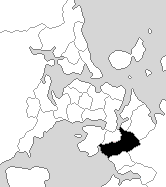
Otara was a New Zealand parliamentary electorate in Auckland, from 1984 to 1996. It existed for four parliamentary terms and was represented by three members of parliament, two from Labour and one from National.
The Nelson by-election was a by-election in the New Zealand electorate of Nelson a predominantly urban seat at the top of the South Island.

The Tamaki by-election 1992 was a by-election held in the Tāmaki electorate during the 43rd New Zealand Parliament, on 15 February 1992. It was caused by the resignation of incumbent MP Sir Robert Muldoon and was won by Clem Simich with a majority of 1,252. The by-election was also notable as the first contested by the recently formed Alliance Party, and for their success in coming second ahead of the Labour Party.
The Pahiatua by-election of 1977 was a by-election for the electorate of Pahiatua on 30 April 1977 during the 38th New Zealand Parliament.
The Otahuhu by-election 1963 was a by-election held in the Otahuhu electorate in Auckland during the term of the 33rd New Zealand Parliament, on 16 March 1963.
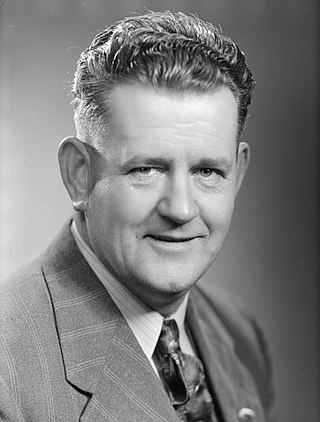
The Onehunga by-election 1953 was a by-election held in the Onehunga electorate in Auckland during the term of the 30th New Zealand Parliament, on 19 December 1953. The by-election was won by Hugh Watt of the Labour Party.

The Moyle Affair was a political scandal that took place in New Zealand in 1976. It involved allegations of homosexuality made in Parliament by Prime Minister Robert Muldoon against opposition MP Colin Moyle. The allegations resulted in a commission of inquiry into Moyle, culminating with his resignation from Parliament.
On 3 February 1983, a New Zealand Labour Party leadership election was held to determine the leadership of the New Zealand Labour Party. The leadership was won by Mangere MP David Lange, who had been Deputy Leader of the party since 1979.
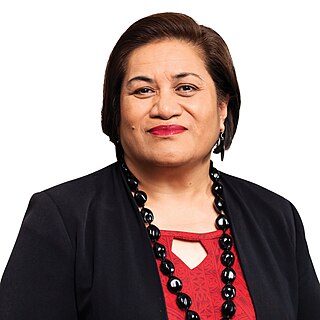
Lemauga Lydia Sosene is a New Zealand Labour Party politician. She was a member of the Māngere-Ōtāhuhu local board from the October 2010 local elections until her election to the New Zealand House of Representatives in May 2022. After completing the balance of Louisa Wall's term as a list MP, Sosene was elected as MP for Māngere at the 2023 general election.
